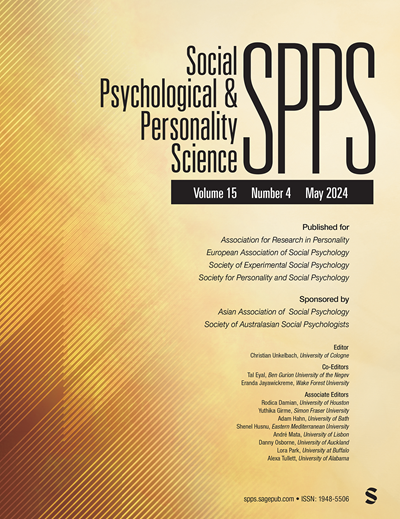在黑钱问题上的对抗性合作
IF 3.3
2区 心理学
Q1 PSYCHOLOGY, SOCIAL
引用次数: 2
摘要
四个在美国成年人抢注的实验(N = 968)、和五个补充实验(N = 869),我们检查了四个账户,可以解释人们的厌恶“脏钱”(即以不道德的方式发的钱):(a)他们认为这在道德上是污染,(b)他们关心非法所有权,(c)他们不希望从道德中获利的过犯,和(d)接受脏钱可能意味着背书的不道德的手段获得的钱。参与者不愿意接受或接触脏钱,但当脏钱失而复得时,他们相对愿意接受。综上所述,这些发现表明,人们对脏钱的厌恶源于对道德败坏的担忧和对脏钱获得方式的认可。本文章由计算机程序翻译,如有差异,请以英文原文为准。
An Adversarial Collaboration on Dirty Money
Across four preregistered experiments on American adults (total N = 968), and five supplemental experiments (total N = 869), we examined four accounts that might explain people’s aversion to “dirty money” (i.e., money earned in immoral ways): (a) they think it is morally tainted, (b) they care about illicit ownership, (c) they do not wish to profit from moral transgressions, and (d) accepting dirty money might imply an endorsement of the immoral means by which the money was acquired. Participants were unwilling to accept or touch dirty money, but they were relatively willing to take dirty money when it is lost and found. Together these findings suggest that people’s aversion to dirty money stems from concerns about both moral taint and endorsing the way in which dirty money was acquired.
求助全文
通过发布文献求助,成功后即可免费获取论文全文。
去求助
来源期刊

Social Psychological and Personality Science
PSYCHOLOGY, SOCIAL-
CiteScore
12.50
自引率
1.80%
发文量
77
期刊介绍:
Social Psychological and Personality Science (SPPS) is a distinctive journal in the fields of social and personality psychology that focuses on publishing brief empirical study reports, typically limited to 5000 words. The journal's mission is to disseminate research that significantly contributes to the advancement of social psychological and personality science. It welcomes submissions that introduce new theories, present empirical data, propose innovative methods, or offer a combination of these elements. SPPS also places a high value on replication studies, giving them serious consideration regardless of whether they confirm or challenge the original findings, with a particular emphasis on replications of studies initially published in SPPS. The journal is committed to a rapid review and publication process, ensuring that research can swiftly enter the scientific discourse and become an integral part of ongoing academic conversations.
 求助内容:
求助内容: 应助结果提醒方式:
应助结果提醒方式:


